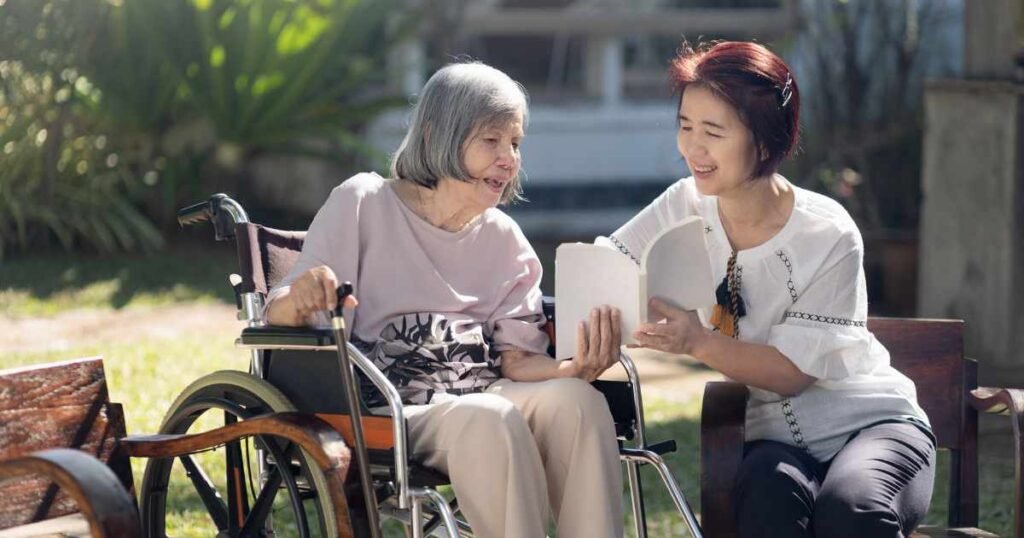Caregivers play a vital role in daily living assistance services, offering crucial support for individuals who need help with everyday tasks. Whether it’s assisting with personal hygiene, meal preparation, mobility, or medication management, caregivers are there to ensure that seniors or individuals with disabilities can live as independently and comfortably as possible. They provide more than just physical assistance—they also offer emotional support, companionship, and a sense of security. In many cases, caregivers become trusted partners in their clients’ lives, offering not only practical help but also a compassionate presence. In this guide and with the help of Deiset Home Care, we will explore the key responsibilities of caregivers and how they enhance the lives of those receiving daily living assistance.

With their expertise and dedication, caregivers make a significant difference in improving the quality of life for those who require daily living assistance services. They provide peace of mind to families, knowing their loved ones are well cared for and supported. The compassionate care provided not only helps with physical tasks but also promotes emotional well-being and social engagement, fostering a sense of dignity and independence.
Understanding Daily Living Assistance Services: An Overview
Daily living assistance services are designed to help individuals who need support with everyday tasks due to age, illness, or disability. These services focus on helping seniors and people with special needs maintain their independence and quality of life. They typically include assistance with activities like bathing, dressing, eating, mobility, and managing medications. Caregivers may also help with household chores such as cleaning and meal preparation. The benefits of daily living assistance for seniors include improved safety, increased independence, and enhanced comfort. These services can be offered in various settings, such as the home, assisted living facilities, or nursing homes.
The Essential Role of Caregivers in Daily Living Assistance
Caregivers are at the heart of fall prevention services, offering personalized support to individuals in need. They are trained to provide both physical and emotional assistance, ensuring that clients remain safe and secure throughout the day. Caregivers assist with tasks such as bathing, dressing, and meal preparation, while also focusing on fall prevention strategies, such as helping with mobility and ensuring the home environment is safe. They are also there for companionship, which can be crucial for emotional well-being. In addition to personal care, caregivers help manage medication schedules and offer mobility support, reducing the risk of falls. They create an environment of trust and comfort, allowing seniors to maintain their dignity while receiving the help they require.
How Caregivers Improve Quality of Life for Seniors
Caregivers significantly improve the quality of life for seniors by offering personalized care tailored to their needs. They provide more than just physical assistance—they also offer emotional support, companionship, and reassurance. By helping with daily tasks, caregivers allow seniors to retain their independence and maintain their routines, which can boost confidence and self-esteem. Regular interactions with caregivers can help combat loneliness and depression, which are common among elderly individuals. In addition, caregivers offer monitoring and safety, reducing the risk of falls or other accidents. This level of care ensures that seniors live in a secure, nurturing environment where they can enjoy life with a higher degree of comfort and well-being.
Key Tasks and Responsibilities in Daily Living Assistance Services
Daily living assistance services cover a wide range of tasks to support individuals in their daily routines. These services include personal care tasks like bathing, grooming, and dressing, as well as assistance with eating and mobility. Caregivers may also help manage medications by ensuring that clients take their prescribed doses on time. In addition, caregivers assist with housekeeping duties such as cleaning, laundry, and meal preparation. They also provide transportation for appointments or social outings. More importantly, caregivers act as companions, offering emotional support and companionship to reduce feelings of isolation. These tasks and responsibilities are essential in helping individuals lead more independent and fulfilling lives, both physically and emotionally.
The Emotional Support Caregivers Provide to Clients
Beyond physical assistance, emotional support is a critical aspect of daily living assistance services. Caregivers offer much-needed companionship and act as a source of comfort for their clients. For many seniors, especially those living alone, caregivers provide a connection to the outside world, helping to reduce loneliness and isolation. They listen to clients’ concerns, offer encouragement, and provide a sense of stability and reassurance. This emotional support helps improve the mental health of those receiving care, as it combats depression and anxiety. Caregivers also help clients feel valued and respected, which can have a positive impact on their overall well-being and outlook on life.
Ensuring Independence Through Daily Living Assistance
One of the main goals of daily living assistance services is to promote independence while ensuring safety and well-being. Caregivers provide the support needed to accomplish tasks that might be difficult or impossible for individuals to do on their own. This support is customized to each person’s needs, allowing them to maintain control over their daily routines and decisions. For example, caregivers may assist with mobility, meal preparation, or personal hygiene, but they encourage clients to do as much as they can independently. This approach fosters a sense of autonomy and helps preserve dignity. With the right balance of help and encouragement, individuals can continue living fulfilling lives in their homes.
How Daily Living Assistance Supports Families
Daily living assistance services offer essential support not just to the individual receiving care but also to their family members. Many families find it challenging to balance their caregiving responsibilities with their personal lives, especially when their loved ones require constant attention. Professional caregivers ease this burden by taking over tasks like personal care, medication management, and household chores. This support allows family members to focus on their own needs, reduce stress, and avoid caregiver burnout. Knowing that their loved ones are in the hands of skilled caregivers also provides families with peace of mind, ensuring that seniors are safe, well cared for, and comfortable, even when they can’t be there themselves.
The Benefits of Personalized Care in Daily Living Assistance
Personalized care is one of the most significant benefits of daily living assistance services. Each individual has unique needs, and a one-size-fits-all approach may not be effective. Personalized care ensures that caregivers tailor their services to meet specific requirements, whether it’s helping with mobility, managing chronic conditions, or providing emotional support. By customizing care plans, caregivers can address both the physical and emotional needs of their clients. This approach helps promote a sense of well-being and enables individuals to stay as independent as possible. Furthermore, personalized care builds trust between the caregiver and client, creating a supportive and nurturing environment where individuals feel heard, understood, and cared for.
Adapting Daily Living Assistance to Individual Needs
Adapting daily living assistance services to meet individual needs is essential for providing effective care. Every person has different requirements based on their health conditions, abilities, and preferences. Caregivers work with clients and their families to create personalized care plans that address specific needs, whether it’s assistance with mobility, hygiene, or medication management. By adjusting the level of support, caregivers can provide just the right amount of help to ensure that individuals can maintain as much independence as possible. This flexibility allows caregivers to adjust care as needs change, ensuring that the individual’s well-being is always prioritized. Adapting care plans ensures that services remain relevant and effective over time.
The Impact of Daily Living Assistance on Physical and Mental Health
Daily living assistance services have a profound impact on both the physical and mental health of individuals. Physically, caregivers help ensure that clients take medications on time, avoid falls, and maintain hygiene, all of which contribute to overall health. Proper nutrition, meal preparation, and assistance with mobility also promote physical well-being. Mentally, caregivers offer companionship, reducing feelings of loneliness and isolation. Regular interaction and emotional support help combat depression and anxiety, common issues among seniors and those with disabilities. This combination of physical and emotional care enhances overall well-being, ensuring that clients not only live safely but also enjoy a higher quality of life.
Choosing the Right Caregiver for Daily Living Assistance Services
Choosing the right caregiver for daily living assistance services is crucial to ensuring that an individual’s needs are met effectively and compassionately. It’s important to consider factors such as the caregiver’s experience, training, and compatibility with the individual’s personality and preferences. Ideally, caregivers should be empathetic, patient, and able to establish trust with clients. Families should also look for caregivers who have experience with specific conditions or tasks, such as dementia care or mobility assistance. Conducting interviews, checking references, and reviewing caregiver certifications are all part of selecting the right person.

Conclusion
In conclusion, daily living assistance services play a crucial role in enhancing the quality of life for individuals who need support with daily activities. Caregivers provide not only physical help with tasks such as bathing, dressing, and meal preparation but also offer emotional support, companionship, and a sense of security. By tailoring services to meet the unique needs of each individual, caregivers help promote independence while ensuring safety and well-being. These services offer immense value to families, providing them with peace of mind and relieving caregiving burdens. Ultimately, daily living assistance helps individuals maintain their dignity, stay engaged with life, and live comfortably, whether at home or in an assisted living facility.
FAQs
What is daily living assistance?
Daily living assistance refers to help with basic activities like bathing, dressing, eating, and mobility, provided by caregivers. It ensures individuals maintain independence and comfort in their daily routines.
Who benefits from daily living assistance services?
Seniors, individuals with disabilities, or those recovering from an illness or surgery benefit most from these services. They receive support for tasks that might be difficult or unsafe to manage alone.
How are daily living assistance services tailored?
Services are customized based on the individual’s needs, preferences, and health conditions. Caregivers provide a personalized approach to ensure optimal care and comfort for each client.
Can caregivers offer medical care in addition to daily assistance?
Caregivers in daily living assistance services typically provide non-medical care. However, some may assist with medication reminders, and a healthcare professional may be involved for medical needs.
How can I find the right caregiver for daily living assistance?
Look for reputable agencies or services with trained, experienced caregivers who specialize in daily living support. Interviews and references can help ensure a good match for your loved one’s needs.
